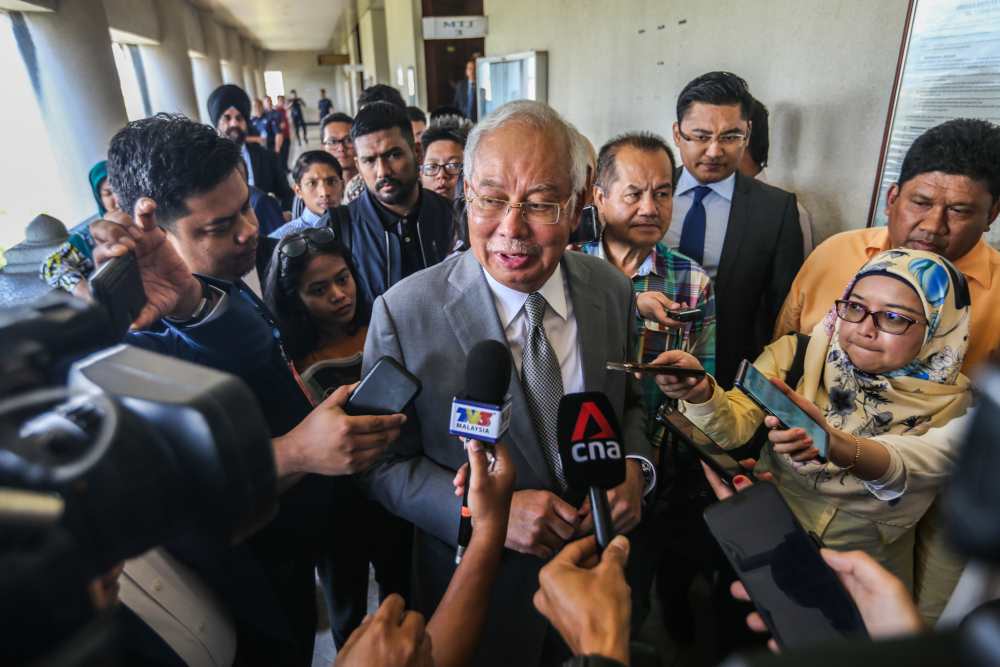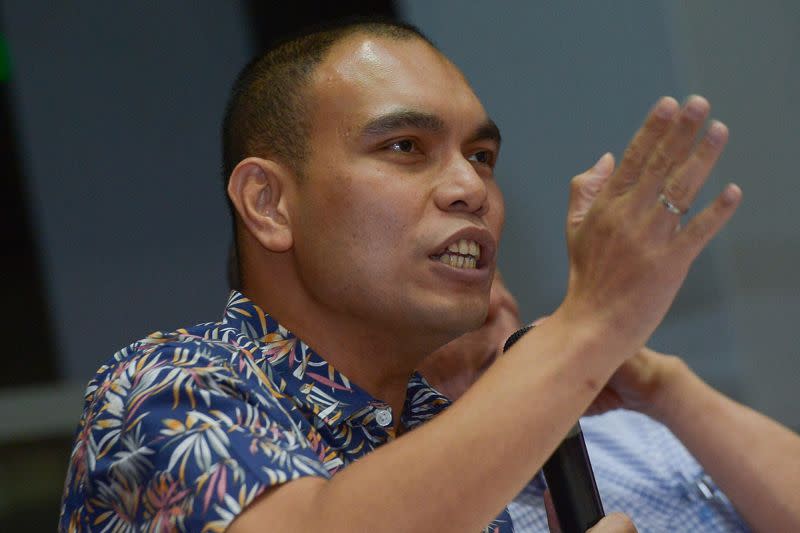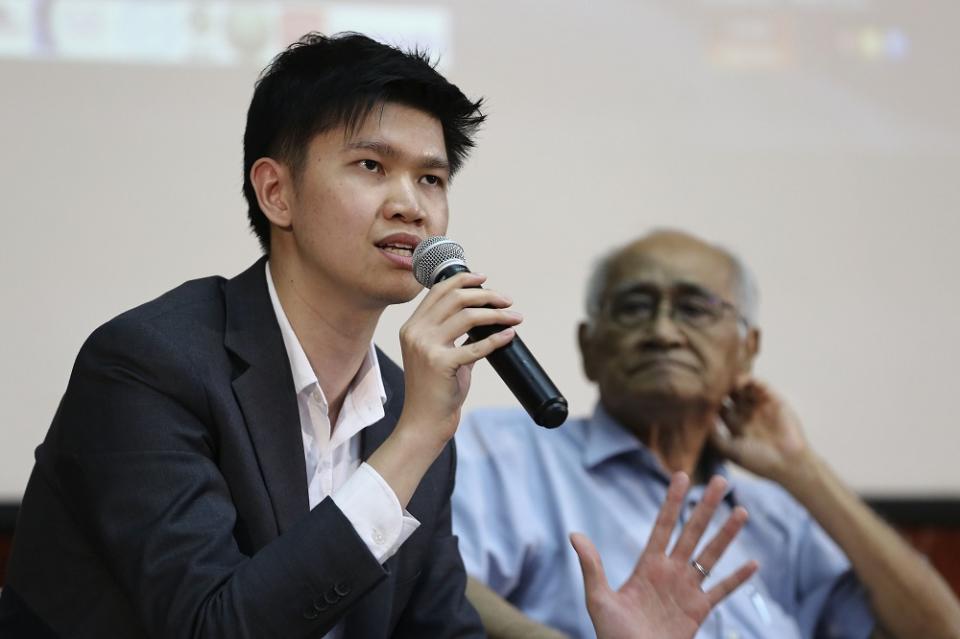The Najib tapes: Your privacy and the laws that allow phone tapping in Malaysia

KUALA LUMPUR, Jan 10 ― The Malaysian Anti-Corruption Commission’s public release of shocking audio clips allegedly involving Datuk Seri Najib Razak has raised concerns on the use of phone tapping against ordinary citizens under the law and your rights to privacy.
Here's a quick look at the key questions of what the alleged recorded phone conversations mean for Malaysians, based on the government's official replies in Parliament and also views by lawyers:
1. The five laws that allow phone tapping
In a June 12, 2014 parliamentary reply, then minister Datuk Seri Nancy Shukri cited five laws, including the Criminal Procedure Code's Section 116C which allows for the public prosecutor to authorise police officers to intercept communications if he considers the communication is likely to contain information related to the commission of a crime.
Under Section 116C, the type of interception of communications that can be authorised includes the opening of postal items, listening to or recording “any conversation”, or the intercepting of “any message” transmitted or received.
It also provides for the public prosecutor authorising police officers to enter any premises to install devices to intercept specified communications, or the public prosecutor to require a communications service provider to intercept and retain specified communications that were received or transmitted or about to be received or transmitted.
A similar provision is found in Section 43 of the Malaysian Anti-Corruption Commission Act, where an MACC officer with at least the rank of superintendent can seek the public prosecutor or MACC commissioner's authorisation for MACC officers to intercept postal articles, messages, and listen to and record any conversations if considered to have relevant information for corruption investigations.
Section 11 of the Kidnapping Act also allows the public prosecutor to authorise police officers to carry out such interception if the information contained is considered to be related to ransom payments for the release of those wrongfully confined or wrongfully restrained, while Section 27A of the Dangerous Drugs Act allows senior police officers or senior custom officers to seek the public prosecutor's authorisation for similar interception of communications if considered to be likely to have information linked to preparations to commit or the committing of drug offences.
Section 6 of the Security Offences (Special Measures) Act also allows the public prosecutor to authorise police officers or anyone to carry out such interception if the communication is considered to likely have information linked to a security offence being committed, but also goes further by allowing a police officer of at least the rank of superintendent to carry out such interception without first getting the public prosecutor's authorisation “in urgent and sudden cases where immediate action is required leaving no moment of deliberation” before later informing the public prosecutor.
In short:
If the communication is considered to be “likely” to have information related to a crime, a corruption investigation, ransom payment related to kidnapping cases, drug offences, security offences, the law allows for authorised interception and listening and recording of your communication with others.
(Security offences include crimes against the country such as waging war or activities detrimental to parliamentary democracy, terrorism offences, organised crime or offences related to gangs, human trafficking and migrant smuggling.)
2. Something you should remember about these laws, it can be used against you if you are charged
Aside from Sosma's Section 6, the other four provisions in the four laws all state that any information obtained through the authorised interception shall be admissible as evidence in court during the trial of individuals charged with an offence under the same laws. The Criminal Procedure Code (CPC) provision applies generally when a person is charged with any offence.

3. Adding privacy safeguards
Constitutional lawyer Surendra Ananth said that phone tapping is a breach of the right to privacy and freedom of expression, saying that it can only be done in very limited circumstances.
“Under international human rights law, any law authorising recording must be clear, necessary and limited to legitimate aims ― for example ― public order, national security and the prevention of crime. It must also have the necessary safeguards to prevent abuse.
“Section 116C of the CPC and Section 43 of the MACC Act is too wide in my view. Further it has no necessary safeguards. At the very least, the decision of the Public Prosecutor (PP) should be subject to review by an internal committee. The authorisation of the PP must be limited and precise to the harm sought to be addressed,” he told Malay Mail.
He noted that the way the law is worded does not require a person to be a suspect to have communications intercepted.

Lawyer Syahredzan Johan said that he had always maintained that the provisions of Section 116C of the CPC and Section 6 of Sosma without proper safeguards would appear to violate certain fundamental liberties that are guaranteed by the Federal Constitution.
“So I think we have to look at these issues of privacy. It's not been the most talked-about issue in Malaysia and certainly there's not much political will on both sides of the divide to actually address the issue of privacy.
“But if now Malaysians with these revelations now feel strongly about privacy, I think we can start looking at these provisions to see whether there needs to be further safeguards,” he told Malay Mail when contacted.

4. Is there legal protection for your privacy?
Constitutional lawyer Lim Wei Jiet noted that local laws like Section 116 of the CPC and Section 43 of the MACC Act allows for the government to intercept communications and carry out phone tapping in exceptional circumstances like for matters linked to crime and national security.
“But some may justifiably argue that such laws are disproportionate and do not provide enough safeguards to right to privacy, and therefore in breach of the Constitution and international legal standards,” he said, later adding however that so far no one has challenged the legality or constitutionality of Section 116 and Section 43.
He pointed to better protection of privacy in such laws globally.
“In best practices around the world, authorities can only intercept if there is a high likelihood of a crime being committed, if alternative measures are not feasible and a court warrant is granted (not the public prosecutor). So the threshold is higher and right to privacy is better protected,” he said.
Lim said that Malaysia has no law that expressly protects Malaysians' right to privacy, pointing out that the country's Personal Data Protection Act “only governs how one should handle personal data which has been collected in business transactions” and “has nothing to do with whether one can intercept” communications.
Lim said that past court cases suggest that the right to privacy is protected under the Federal Constitution's Article 5 guaranteeing the right to life, but noted that this was relatively untested waters and it would be interesting to see the outcome of cases on the right to privacy.
“So, in other words, if the authorities tap, you can claim your right to privacy is breached and possibly ask for such evidence to be rendered inadmissible in Court.
“If a private party taps, you can file a civil claim for infringement of privacy under tort and get damages,” Lim said, having noted that it is unlawful for a private individual or private party such as a telco provider to carry out phone tapping.
Surendra said that those who had their phone tapped or phone conversations recorded could due the person tapping for breach of privacy depending on the situation.
“However if it was done in accordance with law then it would be difficult to mount a claim. It is still open to such party to then challenge the constitutionality of Section 116C,” he said.
Surendra said that such constitutional challenges could be based on Article 10(1) protecting freedom of expression and Article 5(1) on the right to life and personal liberty which he said the Federal Court has recognised to include the right to privacy.
5. Is Najib the first alleged person to have his phone tapped in Malaysia?
This question of how many individuals the government has been spying on has been raised in Parliament before, with DAP MP Liew Chin Tong asking twice in March 2014 and June 2014 for the total number of interception of emails, post and telecommunications by the government in the separate categories of politicians, criminal suspects and the public during 1998 to 2014.
On June 12, 2014, Nancy's reply then as a minister in the Prime Minister's Department was that there has been no interception of communications involving any politician since 2009.
She had also explained that applications for interception of communications are made during investigations by police and other enforcement agencies, but said that these were usually not in reference to any subjects but were aimed at obtaining information and evidence for investigations and intelligence-gathering.
In response to a similar parliamentary question in November 2014 by former DAP MP Julian Tan Kok Ping for figures for the period 1998 to 2014, the government replied that no interception on emails or postal items have been carried out, with records showing only interception of telecommunications.
“Based on statistics of telecommunications interception also, there are no interception of communications that involved any politicians or the public,” Nancy had said in the November 2014 reply.
In a 2017 parliamentary reply to DAP MP Steven Sim who had asked for statistics on phone tapping, electronic tagging and requests for personal information from internet service providers, the Communications and Multimedia Ministry said that the Personal Data Protection Department had not recorded any cases or complaints of phone tagging since the Personal Data Protection Act ― governing the processing of personal data ― came into force in 2015 until February 2017.
In November 2019, Deputy Home Minister Datuk Mohd Azis Jamman said in Parliament the government does not tap any device of politicians, but went on to say that the police will take necessary actions regardless of a person's status either when there is wrongdoing or for security measures.
As for crimes committed involving interception of communication of email, post and telecommunications, the government in a March 2014 parliamentary reply said the police's Commercial Crime Investigation Department's records showed that the highest number of cases during the 2007-2013 period occured in 2013 with 94 such cases resulting in losses of over RM12.5 million. This is in contrast to 2011's five recorded cases with RM960,150 in losses, and 32 cases in 2012 resulting in over RM4.6 million in losses.
These crimes relate to cases such as fraud involving online banking transactions, hacking of online bank accounts, hacking of victims' emails to obtain usernames and passwords, as well as scams to make payments to accounts.
At this point in time, the alleged Najib recordings were said to have been given anonymously to the MACC shortly after New Year's Day this year, and it is not clear if the recordings were made by private actors or if anyone else had their phones tapped in a similar way.
Related Articles Youth and Sports minister wants MACC officer stationed at his office AG pleads for patience and leeway from judiciary to look into 27 ‘kleptocracy cases’ Veterans group lauds MACC for releasing Najib tapes, says a step towards full independence



